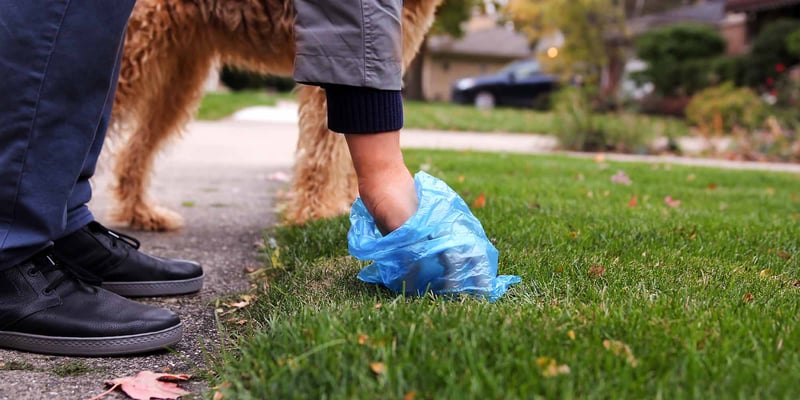Index:



What is normal poo?
Let’s start with getting to know the norm. Normal dog poo tends to be firm, a bit moist and it is meant to be a bit smelly (sadly).
This means your pup has lots of fibre in their diet, all a good sign. If your dog’s poo is unbearably smelly, this could mean that they are getting too much fibre, which can happen with a lot of dry food diets.
Learning about your dog's gut health is important for any per parent, so keeping an eye on what they eat is always a good idea.
White poo
This is relatively common in dogs who eat a raw food diet. The main reason why poo appears white is due to an increase in calcium, which can sometimes be an obvious sign of chronic constipation.
Of course, constipation can lead to other health issues, so if you can gently implement more fibre to your dog's diet. If your dog's poop begins to become chalky and white, always try and take a sample to the vet for examination, to rule out any other health issues.
White or tan specks
Unfortunately, this is bad news. This indicates a parasite problem, which can be tapeworm or roundworm. Get your pooch to the vet’s urgently to be treated.



Black Poo
This can indicate an internal injury of some sort and turns black in colour due to bleeding further up the digestive tract. Alternatively, it can be an indicator of a problem in the anal area.
Bleeding is never a good sign and a quick trip to the vet is in order to rule out any serious. It could be something small, but it could also indicate cancer so a trip to the vet is in order if your pooch is having this problem.
Greyish poo
This means there is too much fat in your dogs’ diet. You should consider changing your dog’s eating habits, as a diet too high in fat can lead to serious conditions such as pancreatitis.
Consuming too much fat is damaging to your dog’s health in the same way as humans, so make sure your dog is eating a healthy diet.
Mild diarrhoea
If your pup is producing a low amount of diarrhoea, this is often a sign of a problem in the large intestine.
This can include worms, ulcers or cancer, so it’s important to go to your vet to find out what the problem is.
Severe diarrhoea
More than 3 dumps of diarrhoea in one day could potentially indicate a problem in the small intestine.
This could be caused by a number of things, such as a bacterial or viral infection, an injury, or your dog could have eaten something that doesn’t agree with them. Taking a stool sample to the vet is your best bet of finding out the cause to this one.
Waggel Pet Insurance
Need more help? You're in luck if you're a Waggel Pet Insurance member. Along with our excellent coverage, we offer access to a 24/7 online vet to answer all your sticky questions, especially if you need grooming assistance.
Not a member? Why not get a quote now and cover your furry friend for a range of illnesses, all while enjoying our amazing perks and rewards.
Want more like this?
Get updates from us with helpful info, advice, answers to frequently asked questions and much more.
Index:
Related posts:
Get your quote
Along with our excellent coverage, we offer access to a 24/7 online vet to answer all your sticky questions.





